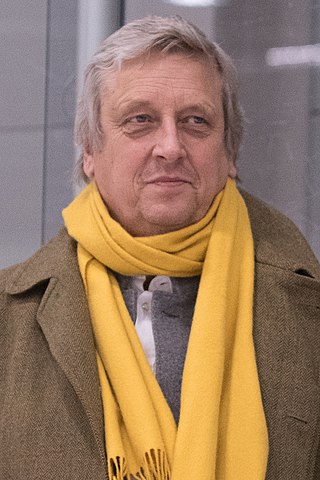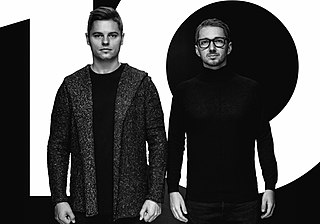
Latvia has participated in the Eurovision Song Contest 22 times since making its debut at the contest in 2000, where the group Brainstorm finished third with the song "My Star". Latvia won the contest in 2002, with Marie N and the song "I Wanna", defeating Malta by 12 points. Latvia is the second former Soviet country to win the contest. The 2003 contest was held in the Latvian capital Riga. The country achieved its third top 10 result in 2005, when Walters and Kazha finished fifth with "The War Is Not Over".
Zodiac was a space disco music band that existed in the 1980s in Latvia, then a part of Soviet Union. The band was extremely popular in the Soviet Union and has been credited by critics as the Soviet answer to the French band Space who were popular at the time.
Līvi was a Latvian hard rock and heavy metal band that was influential in the formation of Latvian rock culture. They were known for their poetic lyrics and guitar solos.
Latvia participated in the Eurovision Song Contest 2005 with the song "The War Is Not Over" written by Mārtiņš Freimanis. The song was performed by Walters and Kazha. Songwriter Mārtiņš Freimanis represented Latvia in the Eurovision Song Contest 2003 as part of the group F.L.Y. with the song "Hello from Mars" where they placed twenty-fourth in the competition. The Latvian broadcaster Latvijas Televīzija (LTV) organised the national final Eirodziesma 2005 in order to select the Latvian entry for the 2005 contest in Kyiv, Ukraine. Twenty songs were selected to compete in the national final, which consisted of three shows: two semi-finals and a final. In the semi-finals on 29 January and 5 February 2005, five entries were selected to advance from each show: three entries selected based on a public televote and two entries selected by a jury panel. Ten songs ultimately qualified to compete in the final on 26 February 2005 where two rounds of public voting selected "The War Is Not Over" performed by Valters and Kaža as the winner.
Latvia participated in the Eurovision Song Contest 2009 with the song "Probka" written by Kārlis Lācis, Jānis Elsbergs and Sergejs Timofejevs. The song was performed by Intars Busulis. The Latvian broadcaster Latvijas Televīzija (LTV) organised the national final Eirodziesma 2009 in order to select the Latvian entry for the 2009 contest in Moscow, Russia. Twenty songs were selected to compete in the national final, which consisted of two shows: a semi-final and a final. In the semi-final, ten entries were selected to advance based on a public vote. Ten songs ultimately qualified to compete in the final on 28 February 2009 where two rounds of voting by the public and a five-member jury panel selected "Sastrēgums" performed by Intars Busulis as the winner. The song was later translated from Latvian to Russian for the Eurovision Song Contest and was titled "Probka".

Zigmars Liepiņš (born 14 October 1952 in Liepāja, Latvian SSR, USSR is a Latvian composer, keyboard player and the chairman of the board for the Latvian National Opera. Liepiņš has written songs for choirs, solo artists, orchestras, films, theatres, and operas.

Intars Busulis is a Latvian singer, trombonist and musician in a Musical Union Intars Busulis & Abonementa orķestris. Wider recognition came from participation in a band called "Caffe", in 2001. Also, he has been the winner of several music competitions, as well as, he represented Latvia in Eurovision Song Contest 2009.

Microphone Records is a Latvian record label and distribution company founded in 1993 by professional radio journalist Elita Mīlgrāve and professional record producer and musician Guntars Račs. Since 1996 Microphone Records has a license agreement with the EMI Group on promoting and marketing EMI and Virgin artists in the Baltic states.
Latvia debuted in the Eurovision Song Contest 2000 with the song "My Star" by band Brainstorm. The song was written by band's lead singer Renārs Kaupers. The Latvian broadcaster Latvijas Televīzija (LTV) organised the national final Eirodziesma 2000 in order to select the Latvian entry for the 2000 contest in Stockholm, Sweden. Ten songs were selected to compete in the national final on 26 February 2000 where a public televote and a fourteen-member jury panel selected "My Star" performed by Brainstorm as the winner.

Musiqq is a Latvian pop music duo from Liepāja formed by Marats Ogļezņevs and Emīls Balceris. The duo first gained exposure in June 2009 with the release of their first single “Klimata kontrole”("Climate control"), but on October 1 their second single "Abrakadabra" came out, which was a radio hit in Latvia and "SEB Musical Bank 2009" winner. Their debut album "Šī ir tikai mūzika"("This is just music") was released in March 2010, which included radio hits such as "Abrakadabra", "Dzimšanas diena" ("Birthday") and "Klimata kontrole". Both singers were awarded as "Gada Liepājnieks"("Liepajnieks of the year" is a prize awarded for those, who have invested their time, effort and talent into making the city a better place) in nomination "'Music" and received three Copyright infinity prizes, because their songs are the most played on the radio, television and concerts. Musiqq represented Latvia in 2011 Eurovision Song Contest Düsseldorf with the song "Angel in Disguise".
Latvia participated in the Eurovision Song Contest 2012 with the song "Beautiful Song" written by Ivars Makstnieks and Rolans Ūdris. The song was performed by Anmary. The Latvian broadcaster Latvijas Televīzija (LTV) organised the national final Eirodziesma 2012 in order to select the Latvian entry for the 2012 contest in Baku, Azerbaijan. Twenty songs were selected to compete in the national final, which consisted of three shows: two semi-finals and a final. In the semi-finals on 7 and 14 January 2012, five entries were selected to advance from each show. Ten songs ultimately qualified to compete in the final on 7 January 2012 where two rounds of voting by a public televote and a ten-member jury panel selected "Beautiful Song" performed by Anmary as the winner.
Latvia participated in the Eurovision Song Contest 2003 with the song "Hello from Mars" written by Mārtiņš Freimanis and Lauris Reiniks. The song was performed by the group F.L.Y. In addition to participating in the contest, the Latvian broadcaster Latvijas Televīzija (LTV) also hosted the Eurovision Song Contest after winning the competition in 2002 with the song "I Wanna" performed by Marie N. LTV organised the national final Eirodziesma 2003 in order to select the Latvian entry for the 2003 contest in Riga. Fifteen songs were selected to compete in the national final on 1 February 2003 where two rounds of public televoting selected "Hello from Mars" performed by F.L.Y. as the winner.
Latvia participated in the Eurovision Song Contest 2004 with the song "Dziesma par laimi" written by Tomass Kleins and Guntars Račs. The song was performed by Fomins and Kleins. The Latvian broadcaster Latvijas Televīzija (LTV) organised the national final Eirodziesma 2004 in order to select the Latvian entry for the 2004 contest in Istanbul, Turkey. Ten songs were selected to compete in the national final on 28 February 2004 where two rounds of public televoting selected "Dziesma par laimi" performed by Fomins and Kleins as the winner. This was the first time that the Latvian song was performed in the Latvian language at the Eurovision Song Contest.
Latvia participated in the Eurovision Song Contest 2013 with the song "Here We Go" written by Ralfs Eilands and Arturas Burke. The song was performed by the group PeR. The Latvian broadcaster Latvijas Televīzija (LTV) organised the national final Dziesma 2013 in order to select the Latvian entry for the 2013 contest in Malmö, Sweden. Twenty-four songs were selected to compete in the national final, which consisted of three shows: two semi-finals and a final. In the semi-finals on 8 and 9 February 2013, six entries were selected to advance from each show. Twelve songs ultimately qualified to compete in the final on 16 February 2013 where two rounds of voting by a public televote and a nine-member jury panel selected "Here We Go" performed by PeR as the winner.
Fēlikss Ķiģelis is a Latvian rock musician. He was the founder and frontman of Liepāja's bands Tumsa and Melnā Princese. In 1999 he pursued a solo career. His father Ēriks Ķiģelis was a member of rock bands Līvi and Coprus.
Latvia participated in the Eurovision Song Contest 2014 with the song "Cake to Bake" written by Guntis Veilands. The song was performed by the band Aarzemnieki. The Latvian broadcaster Latvijas Televīzija (LTV) organised the national final Dziesma 2014 in order to select the Latvian entry for the 2014 contest in Copenhagen, Denmark. Twenty-four songs were selected to compete in the national final, which consisted of three shows: two semi-finals and a final. In the semi-finals on 1 and 2 February 2014, six entries were selected to advance from each show. Twelve songs ultimately qualified to compete in the final on 22 February 2014 where two rounds of voting by a public televote and a nine-member jury panel selected "Cake to Bake" performed by Aarzemnieki as the winner.

Rodrigo Fomins better known by the stage name Igo is a Soviet and Latvian singer, poet and composer of rock and other music styles.

Pa un par (On and About) is an album by the Latvian A cappella vocal group Cosmos, that was released on the UPE record label in 2005. The album features original and cover songs in Latvian and English. The recording is entirely vocal, with no instruments used in any of the arrangements.
Latvia participated in the Eurovision Song Contest 2017 with the song "Line" written by Agnese Rakovska, Kristaps Ērglis and Kristians Rakovskis. The song was performed by the group Triana Park. The Latvian broadcaster Latvijas Televīzija (LTV) organized the national final Supernova 2017 in order to select the Latvian entry for the 2017 contest in Kyiv, Ukraine. 22 songs were selected to compete in the national final, which consisted of four shows: two heats, one semi-final and a final. In the heats and the semi-final, four entries were selected to advance from each show: two entries selected based on a public televote and two entries selected by a four-member jury panel. Four songs ultimately qualified to compete in the final on 26 February 2017 where a public vote exclusively selected "Line" performed by Triana Park as the winner.

Kārlis Būmeisters is a Latvian musician, artist, guitarist and TV host once using the stage name Kaža. He is now in politics in the European Parliament in Brussels as a press secretary for the European Parliament Member Roberts Zīle who is part of the European Conservatives and Reformists (ECR) group.







